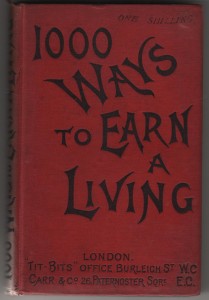According to 1,000 Ways to  Earn a Living (1888) these were the highest and lowest earners in that year.
Earn a Living (1888) these were the highest and lowest earners in that year.
Highest. (sorted highest to lower; highest rate of remuneration quoted)
A ‘star’ equestrian rider in a circus, £100 pw.
National newspaper editor, £2,000 per annum
Leader writer, London newspaper, £1,500 per annum
Drapery buyer, £1,000 per annum
Inspector of Mines, £1,000 per annum
Novelists, possibly £1,000 per book
Lowest ( sorted lowest to higher; lowest rate of remuneration quoted)
General servant in home (female), £8 per annum
Junior hospital nurse, £8 per annum
Feather-maker, 3.6d per week
Waitress, 5s per week
Barmaid, 7s per week
Lifter-up (boy)at printers, 7s 6d per week
Female library assistants, 7s 6d per week
Footman, 8s per week
Groom, 8s per week
Collar-maker, 8s 6d. per week
False teeth maker, 15s per week.
[RR]

